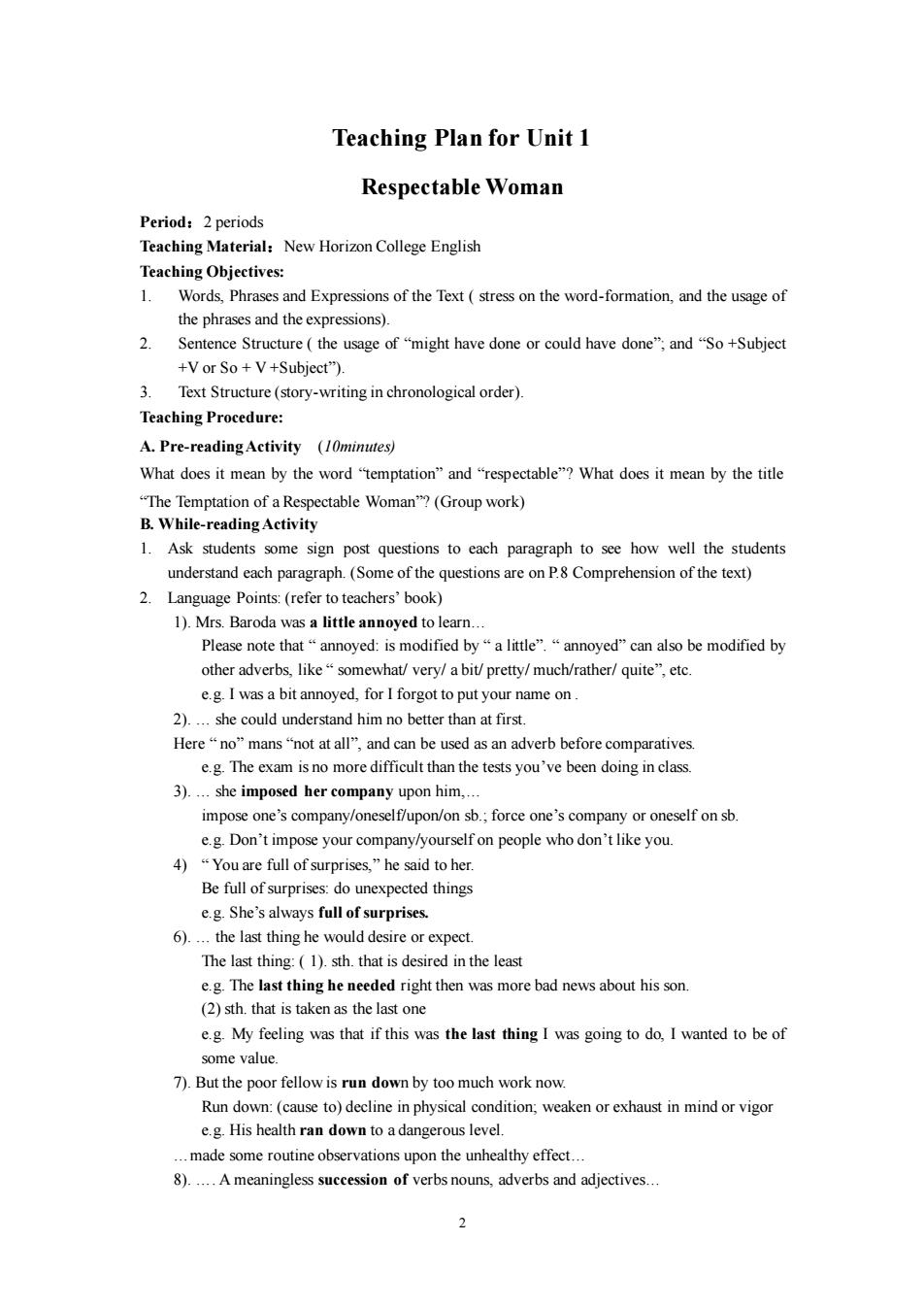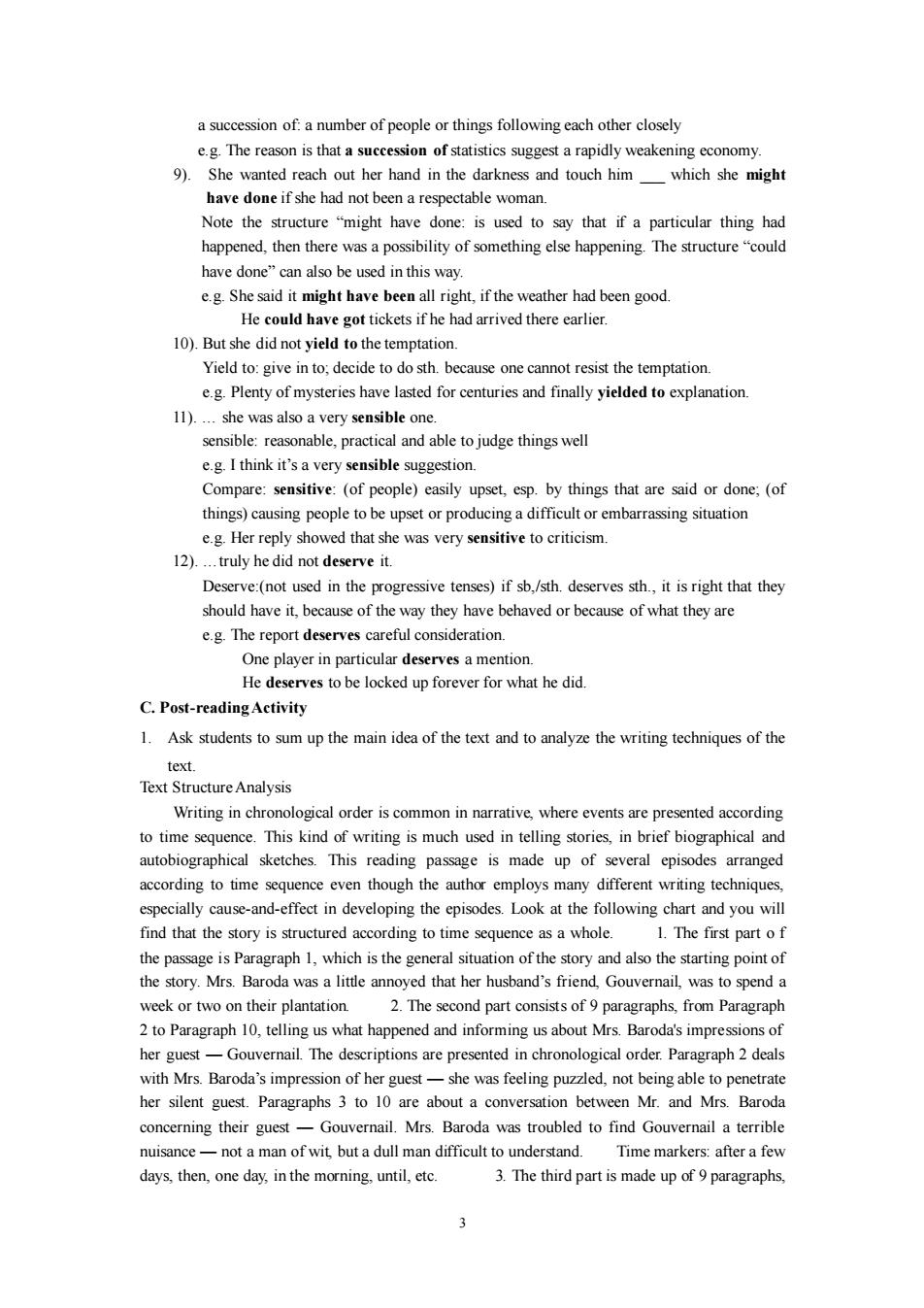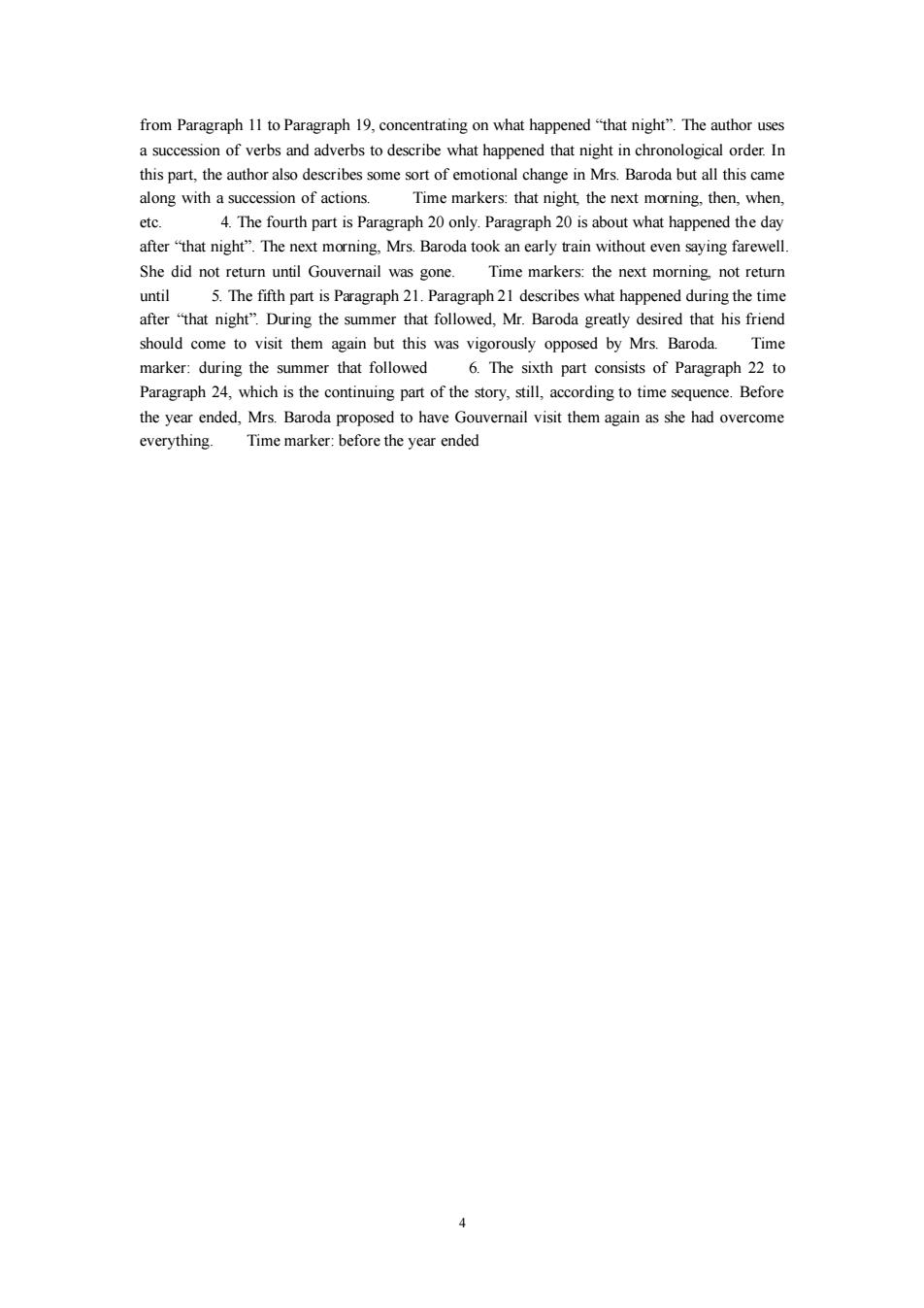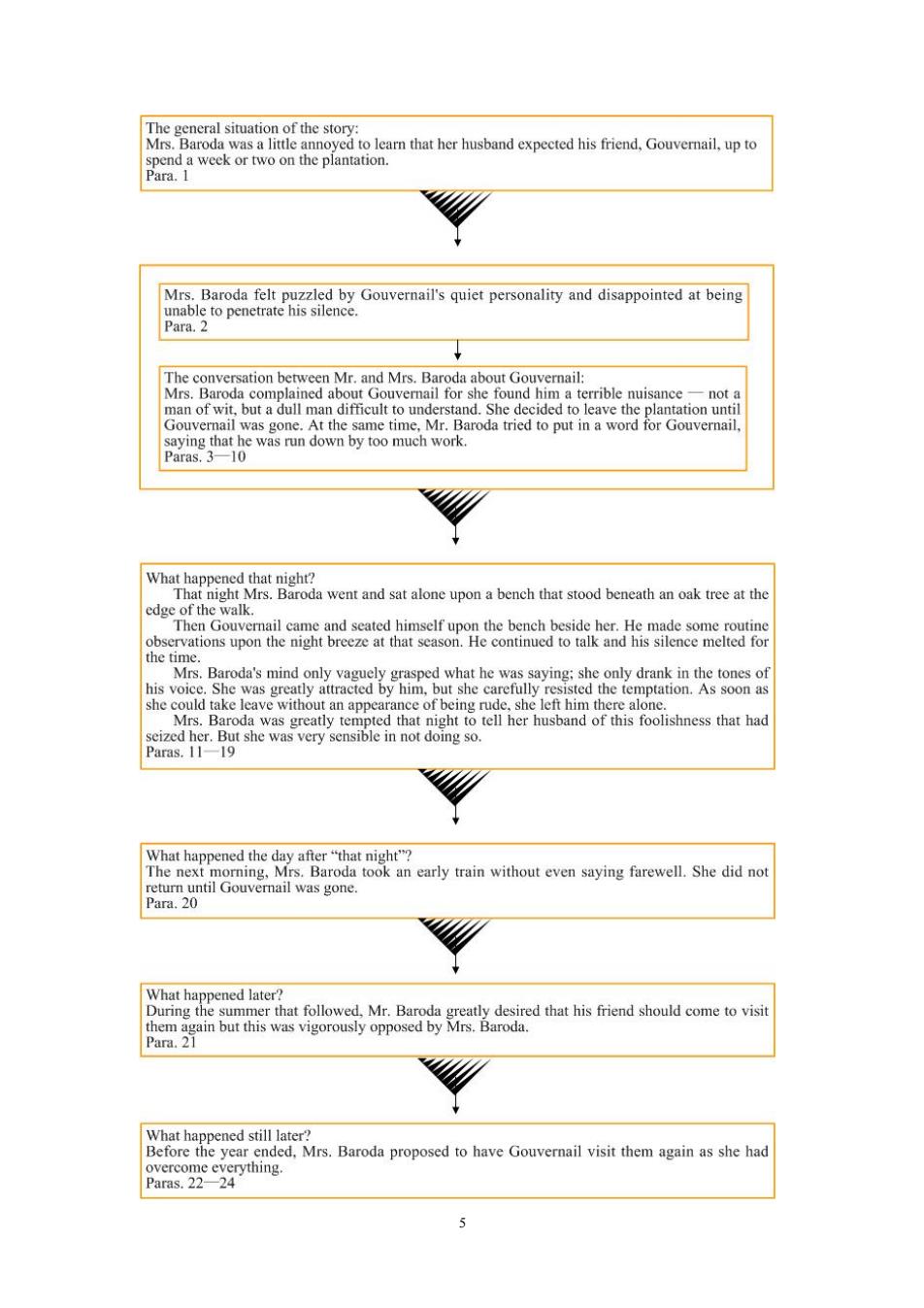
课程名称:新视野大学英语(4)1
1 课程名称:新视野大学英语 (4)

TeachingPlanforUnit1RespectableWomanPeriod:2periodsTeaching Material:New Horizon College EnglishTeaching Objectives:1.Words, Phrases and Expressions of theText(stress on theword-formation,and theusageofthe phrases and the expressions).2.Sentence Structure ( the usage of “might have done or could have done"; and “So +Subject+V or So + V+Subject").3.Text Structure (story-writing in chronological order)Teaching Procedure:A.Pre-readingActivity(1Ominutes)What does it mean by the word “temptation" and “respectable"? What does it mean by the title“The Temptation of a RespectableWoman"?(Group work)B. While-readingActivity1.Ask students some sign post questions to each paragraph to see how well the studentsunderstand each paragraph.(Someof the questions are on P.8 Comprehension of the text)2.LanguagePoints:(refertoteachersbook)1). Mrs. Baroda was a little annoyed to learn..Please note that “ annoyed: is modified by“ a little"“ annoyed" can also be modified byother adverbs, like“ somewhat/ very/ a bit/pretty/ much/rather/ quite", etc.e.g. I was a bit annoyed, for I forgot to put your name on .2)... she could understand him no better than at first.Here“"no"mans“"not at all",and can be used as an adverb beforecomparativese.g.The exam isnomoredifficultthan thetestsyou'vebeen doing inclass3)....sheimposedhercompanyuponhim,..imposeone'scompany/oneself/upon/on sb.;forceone'scompanyoroneselfonsbe.g. Don't impose your company/yourself on people who don't like you.4)“You are full of surprises,"he said to her.Be full of surprises: do unexpected thingse.g. She's always full of surprises.6)...the last thing he would desire or expect.The last thing: ( 1). sth. that is desired in the leaste.g.The last thing heneeded right then was more bad news about his son(2) sth. that is taken as the last onee.g. My feeling was that if this was the last thing I was going to do, I wanted to be ofsome value.7).Butthepoorfellowisrundownbytoomuch worknowRun down: (cause to) decline in physical condition; weaken or exhaust in mind or vigore.g. His health ran down to a dangerous level....made someroutineobservationsupon theunhealthyeffect..8)....Ameaningless succession of verbs nouns, adverbs and adjectives...2
2 Teaching Plan for Unit 1 Respectable Woman Period:2 periods Teaching Material:New Horizon College English Teaching Objectives: 1. Words, Phrases and Expressions of the Text ( stress on the word-formation, and the usage of the phrases and the expressions). 2. Sentence Structure ( the usage of “might have done or could have done”; and “So +Subject +V or So + V +Subject”). 3. Text Structure (story-writing in chronological order). Teaching Procedure: A. Pre-reading Activity (10minutes) What does it mean by the word “temptation” and “respectable”? What does it mean by the title “The Temptation of a Respectable Woman”? (Group work) B. While-reading Activity 1. Ask students some sign post questions to each paragraph to see how well the students understand each paragraph. (Some of the questions are on P.8 Comprehension of the text) 2. Language Points: (refer to teachers’ book) 1). Mrs. Baroda was a little annoyed to learn. Please note that “ annoyed: is modified by “ a little”. “ annoyed” can also be modified by other adverbs, like “ somewhat/ very/ a bit/ pretty/ much/rather/ quite”, etc. e.g. I was a bit annoyed, for I forgot to put your name on . 2). . she could understand him no better than at first. Here “ no” mans “not at all”, and can be used as an adverb before comparatives. e.g. The exam is no more difficult than the tests you’ve been doing in class. 3). . she imposed her company upon him,. impose one’s company/oneself/upon/on sb.; force one’s company or oneself on sb. e.g. Don’t impose your company/yourself on people who don’t like you. 4) “ You are full of surprises,” he said to her. Be full of surprises: do unexpected things e.g. She’s always full of surprises. 6). . the last thing he would desire or expect. The last thing: ( 1). sth. that is desired in the least e.g. The last thing he needed right then was more bad news about his son. (2) sth. that is taken as the last one e.g. My feeling was that if this was the last thing I was going to do, I wanted to be of some value. 7). But the poor fellow is run down by too much work now. Run down: (cause to) decline in physical condition; weaken or exhaust in mind or vigor e.g. His health ran down to a dangerous level. .made some routine observations upon the unhealthy effect. 8). . A meaningless succession of verbs nouns, adverbs and adjectives

a succession of:anumber of people or things following each other closelye.g. The reason is that a succession of statistics suggest a rapidly weakening economy9).Shewanted reachoutherhandinthedarknessand touchhimwhichshemighthavedone if shehad notbeen arespectable woman.Note the structure “might have done: is used to say that if a particular thing hadhappened, then there was a possibility of something else happening. The structure“"couldhave done"can also be used in this waye.g. She said it might have been all right, if the weather had been goodHe could have got tickets if he had arrived there earlier10).But shedidnot yield to the temptationYield to: give in to; decide to do sth. because one cannot resist the temptation.e.g.Plenty ofmysteries have lasted for centuries and finally yielded to explanation11)... she was also a very sensible one.sensible: reasonable, practical and able to judge things welle.g. I think it's a very sensible suggestion.Compare: sensitive:(of people) easily upset, esp.by things that are said or done; (ofthings)causing peopletobe upset orproducinga difficult or embarrassing situatione.g.Her reply showed that she was very sensitive to criticism.12)....trulyhedidnotdeserveit.Deserve:(not used in the progressive tenses) if sb,/sth. deserves sth., it is right that theyshould haveit,because of thewaytheyhavebehaved orbecauseof what they aree.g.The report deserves careful considerationOne player in particular deserves a mention.He deserves to be locked up forever for what he did.C.Post-readingActivity1.Ask students to sum up themain idea of the text and to analyze the writing techniques of thetext.Text StructureAnalysisWriting in chronological order is common in narrative, where events are presented accordingto time sequence. This kind of writing is much used in telling stories, in brief biographical andautobiographical sketches. This reading passage is made up of several episodes arrangedaccording to time sequence even though the author employs manydifferent writingtechniquesespecially cause-and-effect in developing the episodes. Look at the following chart and you willfind that the story is structured according to time sequence as a whole.1. The first part o fthe passage is Paragraph 1, which is the general situation of the story and also the starting point ofthe story. Mrs. Baroda was a little annoyed that her husband's friend, Gouvernail, was to spend aweekortwoontheirplantation2.The second part consists of 9 paragraphs, from Paragraph2toParagraph10,tellingus whathappened and informing usabout Mrs.Baroda's impressions ofher guest—Gouvernail. The descriptions arepresented in chronological order.Paragraph2 dealswith Mrs.Baroda's impression of herguest-shewas feeling puzzled,not beingableto penetrateher silent guest.Paragraphs 3 to 10 are about a conversation between Mr. and Mrs.Barodaconcerning their guest Gouvernail. Mrs. Baroda was troubled to find Gouvernail a terriblenuisance--not a man ofwit, butadull man difficult to understand.Timemarkers:afterafew3. The third part is made up of 9 paragraphs,days, then, one day, in the morning, until, etc.3
3 a succession of: a number of people or things following each other closely e.g. The reason is that a succession of statistics suggest a rapidly weakening economy. 9). She wanted reach out her hand in the darkness and touch him _ which she might have done if she had not been a respectable woman. Note the structure “might have done: is used to say that if a particular thing had happened, then there was a possibility of something else happening. The structure “could have done” can also be used in this way. e.g. She said it might have been all right, if the weather had been good. He could have got tickets if he had arrived there earlier. 10). But she did not yield to the temptation. Yield to: give in to; decide to do sth. because one cannot resist the temptation. e.g. Plenty of mysteries have lasted for centuries and finally yielded to explanation. 11). . she was also a very sensible one. sensible: reasonable, practical and able to judge things well e.g. I think it’s a very sensible suggestion. Compare: sensitive: (of people) easily upset, esp. by things that are said or done; (of things) causing people to be upset or producing a difficult or embarrassing situation e.g. Her reply showed that she was very sensitive to criticism. 12). .truly he did not deserve it. Deserve:(not used in the progressive tenses) if sb,/sth. deserves sth., it is right that they should have it, because of the way they have behaved or because of what they are e.g. The report deserves careful consideration. One player in particular deserves a mention. He deserves to be locked up forever for what he did. C. Post-reading Activity 1. Ask students to sum up the main idea of the text and to analyze the writing techniques of the text. Text Structure Analysis Writing in chronological order is common in narrative, where events are presented according to time sequence. This kind of writing is much used in telling stories, in brief biographical and autobiographical sketches. This reading passage is made up of several episodes arranged according to time sequence even though the author employs many different writing techniques, especially cause-and-effect in developing the episodes. Look at the following chart and you will find that the story is structured according to time sequence as a whole. 1. The first part o f the passage is Paragraph 1, which is the general situation of the story and also the starting point of the story. Mrs. Baroda was a little annoyed that her husband’s friend, Gouvernail, was to spend a week or two on their plantation. 2. The second part consists of 9 paragraphs, from Paragraph 2 to Paragraph 10, telling us what happened and informing us about Mrs. Baroda's impressions of her guest — Gouvernail. The descriptions are presented in chronological order. Paragraph 2 deals with Mrs. Baroda’s impression of her guest — she was feeling puzzled, not being able to penetrate her silent guest. Paragraphs 3 to 10 are about a conversation between Mr. and Mrs. Baroda concerning their guest — Gouvernail. Mrs. Baroda was troubled to find Gouvernail a terrible nuisance — not a man of wit, but a dull man difficult to understand. Time markers: after a few days, then, one day, in the morning, until, etc. 3. The third part is made up of 9 paragraphs

from Paragraph 11 to Paragraph 19,concentrating on what happened“that night"The author usesa succession of verbs and adverbs to describe what happened that night in chronological order. Inthis part, the author also describes some sort of emotional change in Mrs. Baroda but all this camealong with a succession of actions.Time markers: that night, the next morning, then, when,etc.4. The fourth part is Paragraph 20 only. Paragraph 20 is about what happened the dayafter “that night". The next morning, Mrs. Baroda took an early train without even saying farewell.She did not return until Gouvernail was gone.Time markers:the next morning,not returnuntil5. The fifth part is Paragraph 21. Paragraph 21 describes what happened during the timeafter “that night", During the summer that followed, Mr. Baroda greatly desired that his friendshould come to visit them again but this was vigorously opposed by Mrs. Baroda.Timemarker: during the summer that followed6. The sixth part consists of Paragraph 22 toParagraph 24, which is the continuing part of the story, still, according to time sequence, Beforethe year ended, Mrs. Baroda proposed to have Gouvernail visit them again as she had overcomeTime marker: before the year endedeverything.4
4 from Paragraph 11 to Paragraph 19, concentrating on what happened “that night”. The author uses a succession of verbs and adverbs to describe what happened that night in chronological order. In this part, the author also describes some sort of emotional change in Mrs. Baroda but all this came along with a succession of actions. Time markers: that night, the next morning, then, when, etc. 4. The fourth part is Paragraph 20 only. Paragraph 20 is about what happened the day after “that night”. The next morning, Mrs. Baroda took an early train without even saying farewell. She did not return until Gouvernail was gone. Time markers: the next morning, not return until 5. The fifth part is Paragraph 21. Paragraph 21 describes what happened during the time after “that night”. During the summer that followed, Mr. Baroda greatly desired that his friend should come to visit them again but this was vigorously opposed by Mrs. Baroda. Time marker: during the summer that followed 6. The sixth part consists of Paragraph 22 to Paragraph 24, which is the continuing part of the story, still, according to time sequence. Before the year ended, Mrs. Baroda proposed to have Gouvernail visit them again as she had overcome everything. Time marker: before the year ended

The general situation of the story:Mrs.Baroda was a little annoyed to learn thatherhusband expected hisfriend,Gouvermail,uptospendaweekortwoontheplantationPara,1Mrs.Baroda felt puzzled by Gouvernail's quiet personality and disappointed at beingunable to penetrate his silence.Para.2The conversation between Mr.and Mrs.Baroda about Gouvernail:Mrs.Baroda complained about Gouvermail for shefoundhim a terrible nuisancenotaman of wit,but a dull man difficult to understand.She decided to leave the plantation untilGouvernail was gone. At the same time,Mr.Baroda tried to put in a word for Gouvernail.saying thathewasrundownbytoomuchwork.Paras.3-10What happened that night?That night Mrs.Baroda went and sat alone upon a bench that stood beneath an oak tree at theedge of the walk.Then Gouvernail cameand seated himself upon the benchbesideher.Hemade some routineobservations upon thenight breeze at that scason.He continuedto talk andhis silence melted forthetimeMrs.Baroda's mind only vaguelygrasped what he was saying;she only drank in the tones ofhis voice. She was greatly attracted byhim, but she carefully resisted the temptation.As soon asshe could take leave without an appearance of being rude, she left him there alone.Mrs.Baroda was greatly tempted that night to tell her husband of this foolishness that hadseized her.But she was very sensible in notdoing so.Paras.11-19What happened the day after "that night"?The next morning, Mrs.Baroda took an early train without even saying farewell.She did notreturn until Gouvernailwas gone.Para.20Whathappenedlater?During the summer that followed, Mr.Baroda greatly desired that his friend should come to visitthem again but this was vigorously opposed by Mrs.Baroda.Para.21What happened still later?Before the year ended, Mrs.Baroda proposed to have Gouvernail visit them again as she hadovercome everything.Paras.22245
5